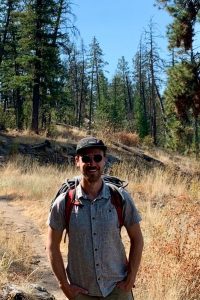
Artist: Viktor Olynyk
As the challenges of wildland firefighting grow increasingly complex, the need for mental resilience among wildfire personnel becomes paramount. For Dan Clouston, MEd ‘24, this realization sparked an exploration into how mindfulness-based practices can support those working in high-stress environments.
Having worked the last two seasons as a rapattack wildland firefighter with the BC Wildfire Service (BCWS), Clouston gained firsthand insight into the challenges and stressors of the job – from physical and mental to interpersonal and environmental.

Dan Clouston
Motivated by his own journey, Clouston set out to explore how he could integrate mindfulness-based training into the BCWS. “Mindfulness-based practices have had, and continue to have, a transformative impact on my life. I feel fortunate to explore integrating this approach into the BCWS as it may support my coworkers in navigating stress and trauma they encounter,” he says.
His research focused on creating a guidebook that introduces mindfulness-based concepts tailored to wildfire personnel. The guidebook is illustrated by graphic artist Viktor Olynyk, also affiliated with the BCWS. Says Clouston, “I hope to make mindfulness-based training accessible and relatable, allowing my coworkers to incorporate these practices into their daily routines.”
Clouston’s illustrated guidebook also serves as a possible pathway toward Mindfulness-Based Mind Fitness Training (MMFT®) – a program aimed at enhancing mental resilience for people working in high-stress environments. Developed by Dr. Elizabeth Stanley at Georgetown University, research shows that MMFT® trains people to function well during and after stressful and traumatic experiences.
As a recent graduate, Clouston hopes his project can expand beyond wildfire agencies to benefit others in high-stress situations. “In today’s world, there are a lot of challenges, disruptions, and uncertainties on the horizon,” he explains. “I believe mindfulness-based practices can empower individuals and communities to navigate these complexities with courage, resiliency, grace, and wisdom, ultimately supporting positive transformational change.”

For students considering a master’s program, Clouston encourages them to remain open to the journey ahead. “As an avid adventurer, I have been fortunate to go on many canoe expeditions. These trips have shaped me as a person and how I view education. On a river trip you never really know what’s around the corner – you can study maps, forecast the weather, strap down gear – yet ultimately paddling down a river is a journey into the unknown. That unknown can sometimes feel scary, sometimes inspiring, sometimes beautiful. I think education is also a journey into the unknown; learning is a process of coming to know things we do not yet know. I feel fortunate to have found a flow within my own master’s journey. There was so much unexpected along the way: from challenging times, to serendipitous moments, to deep learning. My best advice would be to stay open to it all – and enjoy the river.”
***
In recognition of his transformational, creative and interdisciplinary research, Clouston received the Vicki Green Graduate Award on September 12, 2024.
“Being selected for the Vicki Green award is a real honour, and feels like a trail marker on an ongoing research journey,” he says. “It means a lot to be recognized for a project which I truly believe in. I had the pleasure of meeting with Dr. Green in June, and we had a lovely conversation covering many topics. In a roundabout way, this award has also inspired me to start fly fishing!”